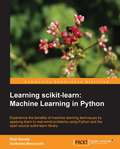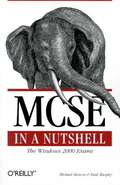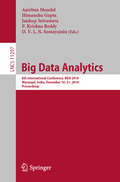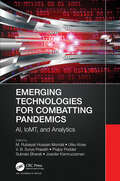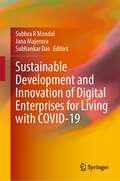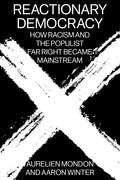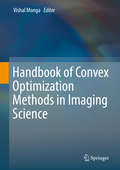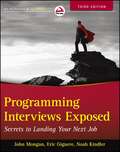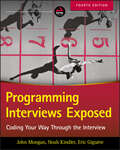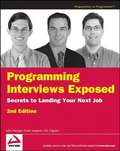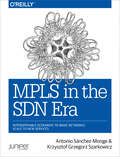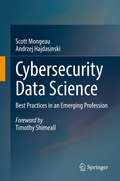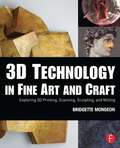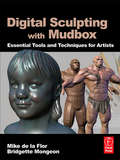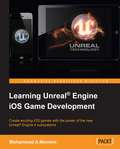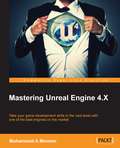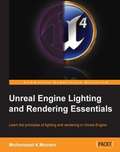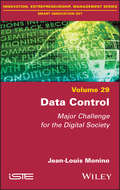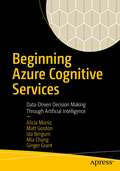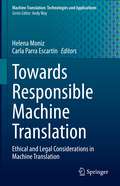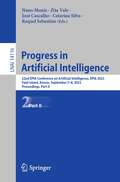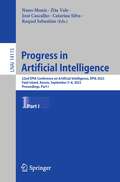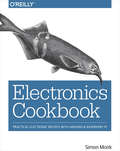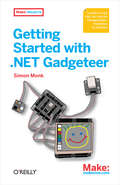- Table View
- List View
Learning scikit-learn: Machine Learning in Python
by Guillermo Moncecchi Raul GarretaThe book adopts a tutorial-based approach to introduce the user to Scikit-learn.If you are a programmer who wants to explore machine learning and data-based methods to build intelligent applications and enhance your programming skills, this the book for you. No previous experience with machine-learning algorithms is required.
MCSE in a Nutshell: The Windows 2000 Exams
by Michael Moncur Paul MurphyThis single book is all that MCSE (Microsoft Certified Systems Engineer) candidates in the Windows 2000 track need to pass the required five MCSE core exams and two elective exams. A comprehensive study guide and detailed quick reference, MCSE in a Nutshell: The Windows 2000 Exams covers the four required exams and three optional ones, two of which can also fulfill the elective requirements.
Trends in Biomathematics: Selected Works from the BIOMAT Consortium Lectures, Szeged, Hungary, 2019
by Rubem P. MondainiThis volume offers a collection of carefully selected, peer-reviewed papers presented at the BIOMAT 2019 International Symposium, which was held at the University of Szeged, Bolyai Institute and the Hungarian Academy of Sciences, Hungary, October 21st-25th, 2019. The topics covered in this volume include tumor and infection modeling; dynamics of co-infections; epidemic models on networks; aspects of blood circulation modeling; multidimensional modeling approach via time-frequency analysis and Edge Based Compartmental Model; and more. This book builds upon the tradition of the previous BIOMAT volumes to foster interdisciplinary research in mathematical biology for students, researchers, and professionals.Held every year since 2001, the BIOMAT International Symposium gathers together, in a single conference, researchers from Mathematics, Physics, Biology, and affine fields to promote the interdisciplinary exchange of results, ideas and techniques, promoting truly international cooperation for problem discussion. The 2019 edition of BIOMAT International Symposium received contributions by authors from 14 countries: Brazil, Cameroon, Canada, Colombia, Czech Republic, Finland, Hungary, India, Italy, Russia, Senegal, Serbia, United Kingdom and the USA. Selected papers presented at the 2017 and 2018 editions of this Symposium were also published by Springer, in the volumes "Trends in Biomathematics: Modeling, Optimization and Computational Problems" (978-3-319-91091-8) and "Trends in Biomathematics: Mathematical Modeling for Health, Harvesting, and Population Dynamics" (978-3-030-23432-4).
Big Data Analytics: 6th International Conference, BDA 2018, Warangal, India, December 18–21, 2018, Proceedings (Lecture Notes in Computer Science #11297)
by Anirban Mondal Himanshu Gupta Jaideep Srivastava P. Krishna Reddy D. V. L. N. SomayajuluThis book constitutes the refereed proceedings of the 6th International Conference on Big Data analytics, BDA 2018, held in Warangal, India, in December 2018. The 29 papers presented in this volume were carefully reviewed and selected from 93 submissions. The papers are organized in topical sections named: big data analytics: vision and perspectives; financial data analytics and data streams; web and social media data; big data systems and frameworks; predictive analytics in healthcare and agricultural domains; and machine learning and pattern mining.
Emerging Technologies for Combatting Pandemics: AI, IoMT, and Analytics
by Mondal, M. Rubaiyat HossainThe COVID-19 pandemic has significantly affected the healthcare sector across the globe. Artificial Intelligence (AI) and the Internet of Medical Things (IoMT) play important roles when dealing with emerging challenges. These technologies are being applied to problems involving the early detection of infections, fast contact tracing, decision-making models, risk profiling of cohorts, and remote treatment. Applying these technologies runs against challenges including interoperability, lack of unified structure for eHealth, and data privacy and security. Emerging Technologies for Combatting Pandemics: AI, IoMT, and Analytics examines multiple models and solutions for various settings including individual, home, work, and society. The world’s healthcare systems are battling the novel coronavirus, and government authorities, scientists, medical practitioners, and medical services are striving hard to surmount these challenges. This book focuses on the design and implementation of AI-based approaches in the proposed COVID-19 solutions that are enabled and supported by IoMT, sensor networks, cloud and edge computing, robotics, and analytics. It covers technologies under the umbrella of AI that include data science, big data, machine learning (ML), semantic technologies, analytics, and cyber security. Highlights of the book include: Epidemic forecasting models Surveillance and tracking systems IoMT and Internet of Healthcare Things-based integrated systems for COVID-19 Social network analysis systems Radiological image- based diagnosis systems Computational intelligence methods This reference work is beneficial for interdisciplinary students, researchers, and healthcare and technology professionals who need to know how computational intelligence could be used for surveillance, control, prevention, prediction, diagnosis, and potential treatment of the disease.
Sustainable Development and Innovation of Digital Enterprises for Living with COVID-19
by Subhra R Mondal Jana Majerova Subhankar DasThis book explores the implications of descriptive, predictive, and prescriptive digital enterprises and their practices for different functional domains and in different counties during COVID-19. This book will bring new dimensions of study to the concept of digital enterprises which is sure to change after COVID-19 as it has upended the way in which people work, live and communicate. Covering a broad range of topics related to digital enterprises, this book is meant for business owners, digital professionals, managers, researchers, and academics who are seeking to integrate digital enterprises in order to allow organizations and countries to stay on a sustainable development trajectory while living with COVID-19.
Reactionary Democracy: How Racism and the Populist Far Right Became Mainstream
by Aurelien Mondon Aaron WinterDemocracy must be anti-racist. Any less is cowardly. Any less is reactionary.Democracy is not necessarily progressive, and will only be if we make it so. What Mondon and Winter call 'reactionary democracy' is the use of the concept of democracy and its associated understanding of the power to the people (demos cratos) for reactionary ends. The resurgence of racism, populism and the far right is not the result of popular demands as we are often told. It is rather the logical conclusion of the more or less conscious manipulation by the elite of the concept of 'the people' and the working class to push reactionary ideas. These narratives place racism as a popular demand, rather than as something encouraged and perpetuated by elites, thus exonerating those with the means to influence and control public discourse through the media in particular. This in turn has legitimised the far right, strengthened its hand and compounded inequalities.These actions diverts us away from real concerns and radical alternatives to the current system. Through a careful and thorough deconstruction of the hegemonic discourse currently preventing us from thinking beyond the liberal vs populist dichotomy, this book develops a better understanding of the systemic forces underpinning our current model and its exploitative and discriminatory basis. The book shows us that the far right would not have been able to achieve such success, either electorally or ideologically, were it not for the help of elite actors (the media, politicians and academics). While the far right is a real threat and should not be left off the hook, the authors argue that we need to shift the responsibility of the situation towards those who too often claim to be objective, and even powerless, bystanders despite their powerful standpoint and clear capacity to influence the agenda, public discourse, and narratives, particularly when they platform and legitimise racist and far right ideas and actors.
Handbook of Convex Optimization Methods in Imaging Science
by Vishal MongaThis book covers recent advances in image processing and imaging sciences from an optimization viewpoint, especially convex optimization with the goal of designing tractable algorithms. Throughout the handbook, the authors introduce topics on the most key aspects of image acquisition and processing that are based on the formulation and solution of novel optimization problems. The first part includes a review of the mathematical methods and foundations required, and covers topics in image quality optimization and assessment. The second part of the book discusses concepts in image formation and capture from color imaging to radar and multispectral imaging. The third part focuses on sparsity constrained optimization in image processing and vision and includes inverse problems such as image restoration and de-noising, image classification and recognition and learning-based problems pertinent to image understanding. Throughout, convex optimization techniques are shown to be a critically important mathematical tool for imaging science problems and applied extensively. Convex Optimization Methods in Imaging Science is the first book of its kind and will appeal to undergraduate and graduate students, industrial researchers and engineers and those generally interested in computational aspects of modern, real-world imaging and image processing problems.
Programming Interviews Exposed
by John Mongan Eric Giguere Noah KindlerBe prepared for your next job interview with this tried-and-true adviceIn today's tight job market, competition for programming jobs is hotter than ever. This third edition of a popular guide to programming interviews includes new code examples, information on the latest languages, new chapters on sorting and design patterns, tips on using LinkedIn, and a downloadable app to help prepare applicants for the interview. Like its earlier editions, this guide covers what software companies and IT departments want their programmers to know and includes plenty of helpful hints to boost your confidence. Looks at current job search and hiring processes, such as the rise of LinkedIn and other social networks as recruiting resourcesAddresses the most important languages for a programmer to know and features examples in multiple languagesIncludes new programming questions designed to sharpen your knowledgeFeatures all-new chapters on design patterns and sorting, including how to deal with memory constraints and mobility issuesWalk into your next job interview with confidence, knowing you have thoroughly studied this newest edition of Programming Interviews Exposed.
Programming Interviews Exposed: Coding Your Way Through the Interview
by John Mongan Noah Suojanen Kindler Eric GiguereAce technical interviews with smart preparation Programming Interviews Exposed is the programmer’s ideal first choice for technical interview preparation. Updated to reflect changing techniques and trends, this new fourth edition provides insider guidance on the unique interview process that today's programmers face. Online coding contests are being used to screen candidate pools of thousands, take-home projects have become commonplace, and employers are even evaluating a candidate's public code repositories at GitHub—and with competition becoming increasingly fierce, programmers need to shape themselves into the ideal candidate well in advance of the interview. This book doesn't just give you a collection of questions and answers, it walks you through the process of coming up with the solution so you learn the skills and techniques to shine on whatever problems you’re given. This edition combines a thoroughly revised basis in classic questions involving fundamental data structures and algorithms with problems and step-by-step procedures for new topics including probability, data science, statistics, and machine learning which will help you fully prepare for whatever comes your way. Learn what the interviewer needs to hear to move you forward in the process Adopt an effective approach to phone screens with non-technical recruiters Examine common interview problems and tests with expert explanations Be ready to demonstrate your skills verbally, in contests, on GitHub, and more Technical jobs require the skillset, but you won’t get hired unless you are able to effectively and efficiently demonstrate that skillset under pressure, in competition with hundreds of others with the same background. Programming Interviews Exposed teaches you the interview skills you need to stand out as the best applicant to help you get the job you want.
Programming Interviews Exposed
by John Mongan Noah Suojanen Eric GiguereThe pressure is on during the interview process but with the right preparation, you can walk away with your dream job. This classic book uncovers what interviews are really like at America's top software and computer companies and provides you with the tools to succeed in any situation. The authors take you step-by-step through new problems and complex brainteasers they were asked during recent technical interviews. 50 interview scenarios are presented along with in-depth analysis of the possible solutions. The problem-solving process is clearly illustrated so you'll be able to easily apply what you've learned during crunch time. You'll also find expert tips on what questions to ask, how to approach a problem, and how to recover if you become stuck. All of this will help you ace the interview and get the job you want. What you will learn from this book Tips for effectively completing the job application Ways to prepare for the entire programming interview process How to find the kind of programming job that fits you best Strategies for choosing a solution and what your approach says about you How to improve your interviewing skills so that you can respond to any question or situation Techniques for solving knowledge-based problems, logic puzzles, and programming problems Who this book is for This book is for programmers and developers applying for jobs in the software industry or in IT departments of major corporations. Wrox Beginning guides are crafted to make learning programming languages and technologies easier than you think, providing a structured, tutorial format that will guide you through all the techniques involved.
MPLS in the SDN Era: Interoperable Scenarios to Make Networks Scale to New Services
by Antonio Sanchez Monge Krzysztof Grzegorz SzarkowiczHow can you make multivendor services work smoothly on today's complex networks? This practical book shows you how to deploy a large portfolio of multivendor Multiprotocol Label Switching (MPLS) services on networks, down to the configuration level. You'll learn where Juniper Network's Junos, Cisco's IOS XR, and OpenContrail, interoperate and where they don't.Two network and cloud professionals from Juniper describe how MPLS technologies and applications have rapidly evolved through services and architectures such as Ethernet VPNs, Network Function Virtualization, Seamless MPLS, Egress Protection, External Path Computation, and more. This book contains no vendor bias or corporate messages, just solid information on how to get a multivendor network to function optimally.Topics include:Introduction to MPLS and Software-Defined Networking (SDN)The four MPLS Builders (LDP, RSVP-TE, IGP SPRING, and BGP)Layer 3 unicast and multicast MPLS services, Layer 2 VPN, VPLS, and Ethernet VPNInter-domain MPLS ServicesUnderlay and overlay architectures: data centers, NVO, and NFVCentralized Traffic Engineering and TE bandwidth reservationsScaling MPLS transport and servicesTransit fast restoration based on the IGP and RSVP-TEFIB optimization and egress service for fast restoration
Cybersecurity Data Science: Best Practices in an Emerging Profession
by Scott Mongeau Andrzej HajdasinskiThis book encompasses a systematic exploration of Cybersecurity Data Science (CSDS) as an emerging profession, focusing on current versus idealized practice. This book also analyzes challenges facing the emerging CSDS profession, diagnoses key gaps, and prescribes treatments to facilitate advancement. Grounded in the management of information systems (MIS) discipline, insights derive from literature analysis and interviews with 50 global CSDS practitioners. CSDS as a diagnostic process grounded in the scientific method is emphasized throughout Cybersecurity Data Science (CSDS) is a rapidly evolving discipline which applies data science methods to cybersecurity challenges. CSDS reflects the rising interest in applying data-focused statistical, analytical, and machine learning-driven methods to address growing security gaps. This book offers a systematic assessment of the developing domain. Advocacy is provided to strengthen professional rigor and best practices in the emerging CSDS profession. This book will be of interest to a range of professionals associated with cybersecurity and data science, spanning practitioner, commercial, public sector, and academic domains. Best practices framed will be of interest to CSDS practitioners, security professionals, risk management stewards, and institutional stakeholders. Organizational and industry perspectives will be of interest to cybersecurity analysts, managers, planners, strategists, and regulators. Research professionals and academics are presented with a systematic analysis of the CSDS field, including an overview of the state of the art, a structured evaluation of key challenges, recommended best practices, and an extensive bibliography.
3D Technology in Fine Art and Craft: Exploring 3D Printing, Scanning, Sculpting and Milling
by Bridgette MongeonThe possibilities for creation are endless with 3D printing, sculpting, scanning, and milling, and new opportunities are popping up faster than artists can keep up with them. 3D Technology in Fine Art and Craft takes the mystery out of these exciting new processes by demonstrating how to navigate their digital components and showing their real world applications. Artists will learn to incorporate these new technologies into their studio work and see their creations come to life in a physical form never before possible. Featuring a primer on 3D basics for beginners,interviews, tutorials, and artwork from over 80 artists, intellectual property rights information, and a comprehensive companion website, this book is your field guide to exploring the exhilarating new world of 3D. Follow step-by-step photos and tutorials outlining the techniques, methodologies, and finished products of master artists who have employed 3D technology in new and inventive ways Learn how to enlarge, reduce, and repurpose existing artwork and create virtual pieces in physical forms through a variety of mediums Research your options with an accessible list of pros and cons of the various software, 3D printers, scanners, milling machines, and vendors that provide services in 3D technology Listen to podcasts with the artists and learn more tips and tricks through the book's website at www.digitalsculpting.net
Digital Sculpting with Mudbox: Essential Tools and Techniques for Artists
by Bridgette Mongeon Mike de la FlorDigital sculpting is the use of tools to push, pull, smooth, grab, pinch or otherwise manipulate a digital object as if it were made of a real-life substance such as clay. Mudbox is the premier sculpting solution for digital artists, in that it allows them to naturally and easily sculpt detailed, organic characters and models in a way that feels like traditional sculpting.This book guides CG professionals through the process of creating amazing digital sculptures using the Mudbox arsenal of ground-breaking digital sculpting and 3D painting tools, and porting the models into their Maya or Max work.Artists will explore tried and true, traditional, sculpting techniques and learn to apply them to digital sculpting. A series of in-depth tutorials are incluced, each challenging them with progressively more complex models as they go on.Unique to this book are topics specific to fine art sculptors transitioning from traditional sculpting to digital sculpting. information found nowhere else for professional sculptors shows them how to successfully integrate digital sculpting into their workflow.Associated web site with: support files, models, materials, and textures for completing the tutorials in the book.
Learning Unreal® Engine iOS Game Development
by Muhammad A. MoniemIf you are a game developer, designer, artist, or a beginner in the gaming industry, and want to make iOS games efficiently at a low cost, this book is ideal for you.
Mastering Unreal Engine 4.X
by Muhammad A. MoniemTake your game development skills to the next level with one of the best engines on the market About This Book * Build an entire AAA game level throughout the book * Take your C++ scripting skills to the next level and use them extensively to build the game * An advanced practical guide with a tutorial style approach that will help you make the best of Unreal engine 4 Who This Book Is For This book is for game developers who have a basic knowledge of Unreal Engine and C++ scripting knowledge. If you want to take the leap from a casual game developer to a full-fledged professional game developer with Unreal Engine 4, this is the book for you. What You Will Learn * Script your player controls in C++ * Build a superb and engaging level with advanced design techniques * Program AI with C++ * Use Cascade to add life to your games * Use custom shaders and advanced shading techniques to make things pretty * Implement an awesome UI in the game * Control gameplay using data tables In Detail Unreal Engine 4 has garnered a lot of attention in the gaming world because of its new and improved graphics and rendering engine, the physics simulator, particle generator, and more. This book is the ideal guide to help you leverage all these features to create state-of-the-art games that capture the eye of your audience. Inside we'll explain advanced shaders and effects techniques and how you can implement them in your games. You'll create custom lighting effects, use the physics simulator to add that extra edge to your games, and create customized game environments that look visually stunning using the rendering technique. You'll find out how to use the new rendering engine efficiently, add amazing post-processing effects, and use data tables to create data-driven gameplay that is engaging and exciting. By the end of this book, you will be able to create professional games with stunning graphics using Unreal Engine 4! Style and approach An advanced guide that will take you to the next level of developing games with Unreal engine with illustrative examples that will make you confident of creating customized professional level games on your won.
Unreal Engine Lighting and Rendering Essentials
by Muhammad A. MoniemLearn the principles of lighting and rendering in the Unreal Engine About This Book * Get acquainted with the concepts of lighting and rendering specific to Unreal * Use new features such as Realistic Rendering and Foliage Shading to breathe new life into your projects * A fast-paced guide to help you learn lighting and rendering concepts in Unreal Who This Book Is For This book is meant for game developers with knowledge of Unreal Engine and a basic understanding of lighting and rendering systems in it. As a prerequisite, you need to have good knowledge of C++. What You Will Learn * Use features such as realistic Rendering and Foliage Shading to create high quality output * Create and edit your materials using the Material Editor * Use Cascade's particle editor to create modular particle-based effects using emitters * Explore Unreal's GPU Visualizer * Tweak the overall look and feel of your scene with post-process effects * Create charts to get stat unit times over a long period of time * Use scalability settings to maintain performance for your games on different platforms and hardware In Detail Unreal Engine is a powerful game development engine that provides rich functionalities to create 2D and 3D games. Developers have the opportunity to build cross-platform mobile and desktop games from scratch. Unreal Engine enables users to create high quality games that focus on individual complexities of game development. This book provides you with the skills required to apply a high level of visual appeal to your games without compromising on performance. Starting with an introduction to the rendering system, you will learn to create different types of materials using the Material Editor. You will then create a particle system based on Cascade editor to create mind-blowing visual effects. Moving on, you will learn the concept of lights in Unreal and different types of dynamic/real-time lights, along with a number of powerful post processing effects. Next, you will learn to improve rendering performance, keeping in mind the rendering limitations for different platforms. At the end of the book, we will discuss the scalability settings menu, and how to add realistic fog effects based on the requirements of your game or level. Style and approach A fast-paced guide filled with hands-on examples to teach you the principles of lighting and rendering in Unreal.
Data Control: Major Challenge for the Digital Society
by Jean-Louis MoninoBusinesses are becoming increasingly aware of the importance of data and information. As such, they are eager to develop ways to "manage" them, to enrich them and take advantage of them. Indeed, the recent explosion of a phenomenal amount of data, and the need to analyze it, brings to the forefront the well-known hierarchical model: "Data, Information, Knowledge". "Data"– this new intangible manna – is produced in real time. It arrives in a continuous stream and comes from a multitude of sources that are generally heterogeneous. This accumulation of data of all kinds is generating new activities designed to analyze these huge amounts of information. It is therefore necessary to adapt and try new approaches, methods, new knowledge and new ways of working. This leads to new properties and new issues as a logical reference must be created and implemented. At the company level, this mass of data is difficult to manage; interpreting it is the predominant challenge.
Beginning Azure Cognitive Services: Data-Driven Decision Making Through Artificial Intelligence
by Alicia Moniz Matt Gordon Ida Bergum Mia Chang Ginger GrantGet started with Azure Cognitive Services and its APIs that expose machine learning as a service. This book introduces the suite of Azure Cognitive Services and helps you take advantage of the proven machine learning algorithms that have been developed by experts and made available through Cognitive Services, easily integrating those algorithms into your own applications without having to develop the algorithms from scratch. The book also shows you how to use the algorithms provided by Cognitive Services to accelerate data analysis and development within your organization. The authors begin by introducing the tools and describing the steps needed to invoke libraries to analyze structured and unstructured text, speech, and pictures, and you will learn to create interactive chatbots using the Cognitive Services libraries. Each chapter contains the information you need to implement artificial intelligence (AI) via Azure Cognitive Services in your personal and professional projects. The book also covers ethical considerations that are becoming increasingly of concern when using AI to drive decision making. You will be introduced to tools such as FairLearn and InterpretML that can help you detect bias and understand the results your models are generating.What You Will LearnInvoke the Cognitive Services APIs from a variety of languages and appsUnderstand common design architectures for AI solutions in AzureDecrease discrimination and bias when creating an AI-driven solutionExecute the examples within the book and learn how to extend those examplesImplement best practices for leveraging the Vision, Speech, and Language parts of the suiteTest Cognitive Services APIs via the Azure portal and using the Postman API toolExecute AI from low-code and no-code platforms like Logic Apps and Microsoft’s Power PlatformWho This Book Is ForTechnical professionals who are interested in implementing artificial intelligence (AI) in pre-existing apps, expanding their value and skill sets, or learning more about AI for personal projects; for programmers working in languages such as C# and Python; and for those using low- and no-code platforms such as Microsoft Power Platform
Towards Responsible Machine Translation: Ethical and Legal Considerations in Machine Translation (Machine Translation: Technologies and Applications #4)
by Helena Moniz Carla Parra EscartínThis book is a contribution to the research community towards thinking and reflecting on what Responsible Machine Translation really means. It was conceived as an open dialogue across disciplines, from philosophy to law, with the ultimate goal of providing a wide spectrum of topics to reflect on. It covers aspects related to the development of Machine translation systems, as well as its use in different scenarios, and the societal impact that it may have. This text appeals to students and researchers in linguistics, translation, natural language processing, philosophy, and law as well as professionals working in these fields.
Progress in Artificial Intelligence: 22nd EPIA Conference on Artificial Intelligence, EPIA 2023, Faial Island, Azores, September 5–8, 2023, Proceedings, Part II (Lecture Notes in Computer Science #14116)
by Nuno Moniz Zita Vale José Cascalho Catarina Silva Raquel SebastiãoThe two-volume set LNAI 14115 and 14116 constitutes the refereed proceedings of the 22nd EPIA Conference on Progress in Artificial Intelligence, EPIA 2023, held in Faial Island, Azores, in September 2023.The 85 full papers presented in these proceedings were carefully reviewed and selected from 163 submissions. The papers have been organized in the following topical sections: ambient intelligence and affective environments; ethics and responsibility in artificial intelligence; general artificial intelligence; intelligent robotics; knowledge discovery and business intelligence; multi-agent Systems: theory and applications; natural language processing, text mining and applications; planning, scheduling and decision-making in AI; social simulation and modelling; artifical intelligence, generation and creativity; artificial intelligence and law; artificial intelligence in power and energy systems; artificial intelligence in medicine; artificial intelligence and IoT in agriculture; artificial intelligence in transportation systems; artificial intelligence in smart computing; artificial intelligence for industry and societies.
Progress in Artificial Intelligence: 22nd EPIA Conference on Artificial Intelligence, EPIA 2023, Faial Island, Azores, September 5–8, 2023, Proceedings, Part I (Lecture Notes in Computer Science #14115)
by Nuno Moniz Zita Vale José Cascalho Catarina Silva Raquel SebastiãoThe two-volume set LNAI 14115 and 14116 constitutes the refereed proceedings of the 22nd EPIA Conference on Progress in Artificial Intelligence, EPIA 2023, held in Faial Island, Azores, in September 2023.The 85 full papers presented in these proceedings were carefully reviewed and selected from 163 submissions. The papers have been organized in the following topical sections: ambient intelligence and affective environments; ethics and responsibility in artificial intelligence; general artificial intelligence; intelligent robotics; knowledge discovery and business intelligence; multi-agent systems: theory and applications; natural language processing, text mining and applications; planning, scheduling and decision-making in AI; social simulation and modelling; artifical intelligence, generation and creativity; artificial intelligence and law; artificial intelligence in power and energy systems; artificial intelligence in medicine; artificial intelligence and IoT in agriculture; artificial intelligence in transportation systems; artificial intelligence in smart computing; artificial intelligence for industry and societies.
Electronics Cookbook: Practical Electronic Recipes with Arduino and Raspberry Pi
by Simon MonkIf you’re among the many hobbyists and designers who came to electronics through Arduino and Raspberry Pi, this cookbook will help you learn and apply the basics of electrical engineering without the need for an EE degree. Through a series of practical recipes, you’ll learn how to solve specific problems while diving into as much or as little theory as you’re comfortable with.Author Simon Monk (Raspberry Pi Cookbook) breaks down this complex subject into several topics, from using the right transistor to building and testing projects and prototypes. With this book, you can quickly search electronics topics and go straight to the recipe you need. It also serves as an ideal reference for experienced electronics makers.This cookbook includes:Theoretical concepts such as Ohm’s law and the relationship between power, voltage, and currentThe fundamental use of resistors, capacitors and inductors, diodes, transistors and integrated circuits, and switches and relaysRecipes on power, sensors and motors, integrated circuits, and radio frequency for designing electronic circuits and devicesAdvice on using Arduino and Raspberry Pi in electronics projectsHow to build and use tools, including multimeters, oscilloscopes, simulations software, and unsoldered prototypes
Getting Started with .NET Gadgeteer
by Simon Monk<p>Learn how to quickly build cool electronic gadgets with .NET Gadgeteer. With the easy-to-follow instructions in this guide, you’ll tackle five fascinating projects, using Microsoft’s rapid prototyping Gadgeteer platform. There’s no soldering involved—you simply plug in modules that make gadget-building quick and easy. Ideal for beginners, this book shows you how to work with modules and other hardware in the popular Fez Spider Starter Kit, and teaches you how to program your gadgets with Visual Studio C# Express and the .NET Micro Framework 4.1 SDK.</p>
